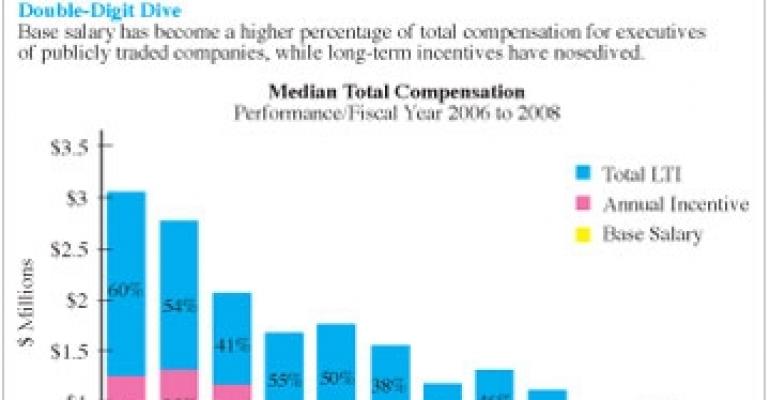When it comes to executive pay, corporate compensation committees have become downright stingy after publicly traded real estate firms racked up anemic earnings and stock appreciation in 2008.
According to a new research study, real estate executives saw their total compensation — which includes base salary, annual incentive/cash bonus and the long-term value of stock awards — decrease for the first time in the past seven years. And not by a little, but by 19%.
The study was conducted by FPL Associates, a consultant to the real estate and financial services industries. The Chicago-based company has conducted its annual survey of the top 100 publicly traded real estate companies for the past seven years.
FPL found that base salaries were flat year-over-year and cash bonuses dropped by 15.7% over 2007 levels. Most significant was the drop in the value of new and annual stock grants, which fell 26.6% due to declines in company stock prices.

According to Jeremy Banoff, managing director at FPL Associates, stellar industry performance over the last few years shielded any focus on real estate executive pay. “Now you’re seeing the first time performance is down, so how are people going to react? The declines that you see in the study speak volumes about the industry,” says Banoff.
Value of equity holdings plummets
In other words, CEOs are finally feeling some of the same pain as their shareholders. A study conducted earlier this year by compensation consultant Steven Hall & Partners and executive search firm Equinox Partners found that the value of equity holdings among CEOs of real estate investment trusts had been cut in half in 2008, while the median decline in stock price was 46%.
“Equity compensation plans are designed to align the interests of shareholders and executives, and this is working as intended," says Steve Hall, managing director of Steven Hall & Partners. “CEOs are clearly feeling shareholders' pain, but boards may be well served by examining compensation programs to ensure that they have adequate glue on key talent critical to spearheading efforts to recoup shareholder value.”
So did the compensation committees get it right? Banoff notes it was a mixed scorecard on that question. “It was a very volatile year, which made it much more difficult for compensation committees to decide how to quantify relative performance.”
FPL’s clients include the top 25% of the publicly traded real estate universe, so the company is involved in direct discussions with compensation committees on a regular basis. While Banoff admits that FPL prefers “pay for performance” measurements, the challenges are many.
“What’s difficult about today’s environment, especially after what we saw taking place in the second half of 2008, is how to think about compensation in 2009,” he notes. “It’s very foggy to predict the next six months, let alone 12 months of what the business is going to look like.” A good case in point is the recent strong performance by REITs. Between March 6 and June 15, the FTSE NAREIT Equity REIT Total Return Index jumped 50%.
REITs need capital
Still, a new set of challenges has reared its head. Through June 15, REITs had raised $15.3 billion in secondary equity offerings. While the offerings normally dilute the shares of existing stockholders, many REITs are in desperate need of working capital, according to Banoff. “What do you do if the equity offering diminishes the company’s performance, but the board signed off on the equity offering?”
“That’s the kind of subjective conversation [about compensation plans] that I would anticipate this year in particular because there are just so many moving pieces and variables that are somewhat outside the control of the company.”
With compensation packages leaner than ever, is the real estate industry on the verge of losing top talent in the C-suite? Unlike in years past, the options for potentially wandering executives are few. “It’s true that from the executive’s perspective they don’t have the golden handcuffs they used to have, but on the other hand where are they going to go?” asks Banoff. “Right now there are very few opportunities out there.”
He also notes that the days of private firms wooing public company executives with highly lucrative compensation packages are over for now. “Private companies can’t offer the same incentives they once did,” Banoff says, “and at least with a public company you have some upside in stock.” That is, of course, if it performs.

